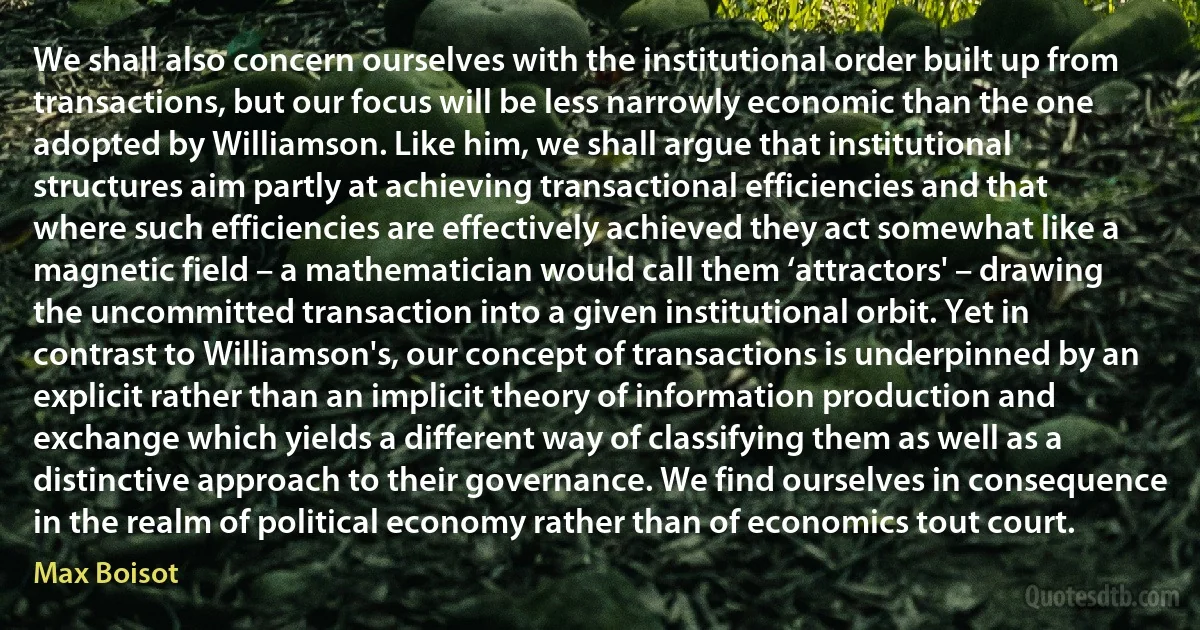
We shall also concern ourselves with the institutional order built up from transactions, but our focus will be less narrowly economic than the one adopted by Williamson. Like him, we shall argue that institutional structures aim partly at achieving transactional efficiencies and that where such efficiencies are effectively achieved they act somewhat like a magnetic field – a mathematician would call them ‘attractors' – drawing the uncommitted transaction into a given institutional orbit. Yet in contrast to Williamson's, our concept of transactions is underpinned by an explicit rather than an implicit theory of information production and exchange which yields a different way of classifying them as well as a distinctive approach to their governance. We find ourselves in consequence in the realm of political economy rather than of economics tout court.
Max BoisotRelated topics
act aim approach built call concept contrast court different distinctive economics explicit field find given less magnetic mathematician orbit order production somewhat way well yetRelated quotes
Harry Dresden: There's power in the night. There's terror in the darkness. Despite all our accumulated history, learning, and experience, we remember. We remember times when we were too small to reach the light switch on the wall, and when the darkness itself was enough to make us cry out in fear. Get a good ways out from civilization-say, miles and miles away on a lightless lake-and the darkness is there, waiting. Twilight means more than just time to call the children in from playing outside. Fading light means more than just the end of another day. Night is when terrible things emerge from their sleep and seek soft flesh and hot blood. Night is when unseen beings with no regard for what our people have built and no place in what we have deemed the natural order look in at our world from outside, and think dark and alien thoughts. And sometimes, just sometimes, they do things.

Jim Butcher
The Court's justification for consulting its own notions rather than following the original meaning of the Constitution, as I would, apparently is based on the belief of the majority of the Court that for this Court to be bound by the original meaning of the Constitution is an intolerable and debilitating evil; that our Constitution should not be 'shackled to the political theory of a particular era,' and that to save the country from the original Constitution the Court must have constant power to renew it and keep it abreast of this Court's more enlightened theories of what is best for our society. It seems to me that this is an attack not only on the great value of our Constitution itself but also on the concept of a written constitution which is to survive through the years as originally written unless changed through the amendment process which the Framers wisely provided.

Hugo Black
Leibnitz, the great mathematician, published his 'Protogaea' in 1680. He imagined this planet to have been originally a burning luminous mass, and that ever since its creation it has been undergoing gradual refrigeration. Nearly all the matter of the earth was at first encompassed by fire. When the outer crust had at length cooled down sufficiently to allow the vapors to be condensed, they fell and formed a universal ocean, investing the globe, and covering the loftiest mountains. Further consolidation produced rents, vacuities, and subterranean caverns, and the ocean, rushing in to fill them, was gradually lowered. The principal feature of this theory, the gradual diminution of the original heat, and of an ancient universal ocean, were adopted by Buffon and De Luc, and entered under different modifications, into a great number of succeeding systems.

Charles Lyell
Every political debate these days contains a lot about economic policies. So much so that sometimes I think people get a little tired of hearing about them. Naturally there is a cry that Government must put people before economics. Who could disagree? That is the very reason why we in our Party have constantly fought Marxism and Communism. Fought Marxism because of -its compulsory society -its nationalisation of the means of production, distribution and exchange. -its attempt to snuff out individual conscience. -the absence of the great voluntary societies which are so much a part of our way of life. -its denial of freedom to choose -its elevation of the values of the State above those of religion. Its denial of the right to educate children outside the state system. -its extinction of private property because property rights support human rights.

Margaret Thatcher
By straying from the text of the Constitution, substantive due process exalts judges at the expense of the People from whom they derive their authority. Petitioners argue that by enshrining the traditional definition of marriage in their State Constitutions through voter-approved amendments, the States have put the issue 'beyond the reach of the normal democratic process'. But the result petitioners seek is far less democratic. They ask nine judges on this Court to enshrine their definition of marriage in the Federal Constitution and thus put it beyond the reach of the normal democratic process for the entire Nation. That a 'bare majority' of this Court is able to grant this wish, wiping out with a stroke of the keyboard the results of the political process in over 30 States, based on a provision that guarantees only 'due process' is but further evidence of the danger of substantive due process.

Clarence Thomas
